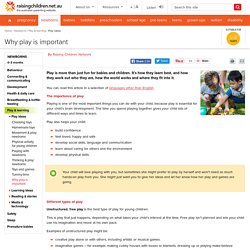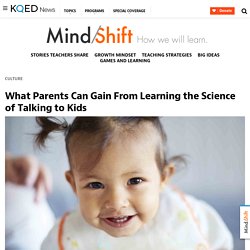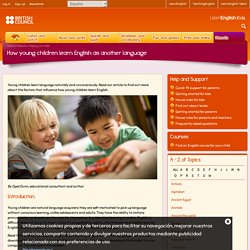

ZERO TO THREE. Different types play. Importance of play for babies & children. Play is more than just fun for babies and children.

It’s how they learn best, and how they work out who they are, how the world works and where they fit into it. You can read this article in a selection of languages other than English. The importance of play Playing is one of the most important things you can do with your child, because play is essential for your child’s brain development. The time you spend playing together gives your child lots of different ways and times to learn.
Play also helps your child: build confidence feel loved, happy and safe develop social skills, language and communication learn about caring for others and the environment develop physical skills. Your child will love playing with you, but sometimes she might prefer to play by herself and won’t need so much hands-on play from you. Different types of play Unstructured, free play is the best type of play for young children. This is play that just happens, depending on what takes your child’s interest at the time. How young children learn English through play. As we release Learning Time with Timmy – our first app for early-years learners of English – Danitza Villarroel, a teacher on our Learning Time with Shaun and Timmy course in Chile, explains the importance of learning through play, and offers a few tips for teachers new to this age group.
Teaching English to pre-school children can be daunting for teachers new to this age group. Young children have shorter attention spans than older children and adults, and they're still learning their mother tongue. But teaching these learners can be enormously rewarding once you've taken a few basic principles on board. The importance of active learning Active learning means fully involving children in the learning process. KA2 Project Outline Form. Turku. Erasmus programmes. eTwinning and little kids!.pptx. Massage In Schools Programme. Day care finland. Early Childhood -Erasmus + -hanke. National curriculum finland. Joy in motion programme. Joy in motion brochure. Joy in motion. Narrative play. Clil window to the world. Physical education early years. Patricia Kuhl: The linguistic genius of babies.
Alison Gopnik: What do babies think? What Parents Can Gain From Learning the Science of Talking to Kids. The widening education gap between the rich and the poor is not news to those who work in education, many of whom have been struggling to close the gap beginning the day poor children enter kindergarten or preschool.

But one unlikely soldier has joined the fight: a pediatric surgeon who wants to get started way before kindergarten. She wants to start closing the gap the day babies are born. When Dr. Dana Suskind began doing cochlear implants on infants at the University of Chicago—a cutting-edge surgical technique that allows once-deaf babies to hear—in her follow-ups with families she noticed a stark difference in how the now-hearing children acquired language. Once they could hear, some children’s language skills thrived and grew, while others languished. The difference turned out to be the words children heard from their parents and caregivers, millions of them. For Suskind, a lightbulb went on. Bringing Parents On Board Of course, some words are more powerful than others.
. * Tune In. How young children learn English as another language. By Opal Dunn, educational consultant and author Introduction Young children are natural language acquirers; they are self-motivated to pick up language without conscious learning, unlike adolescents and adults.

They have the ability to imitate pronunciation and work out the rules for themselves. Any idea that learning to talk in English is difficult does not occur to them unless it’s suggested by adults, who themselves probably learned English academically at a later age through grammar-based text books. Read the notes below about young children learning English as another language. The advantages of beginning early Young children are still using their individual, innate language-learning strategies to acquire their home language and soon find they can also use these strategies to pick up English.
Page from English in Early Childhood - British Council.